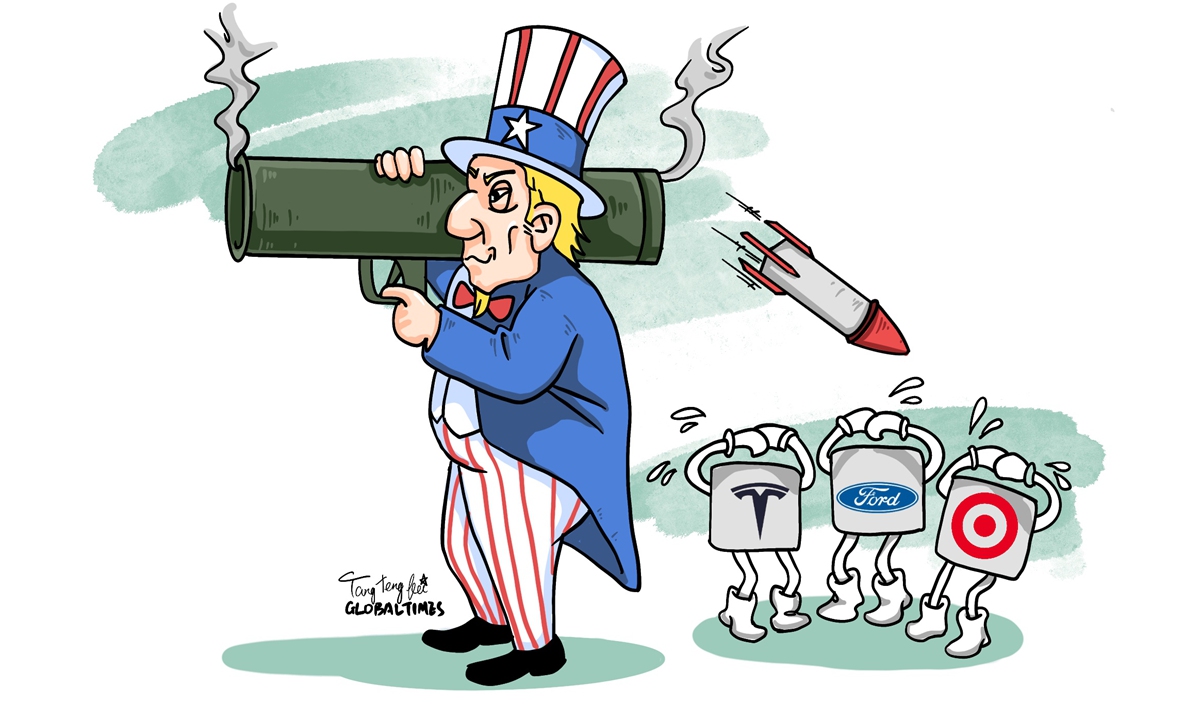Trump bombarded by lawsuits as his tariffs hit businesses
Source: Global Times Published: 2020/9/28 19:39:05

Illustration: Tang Tengfei/GT
With only one month left before the November 3 election, US President Donald Trump is facing a less encouraging opinion poll, as well as mounting lawsuits from American businesses against his administration over the tariffs on supply imports from China.The lawsuits have shown clearly that Trump, who proudly claimed himself as a "tariff man," has hit US firms and customers with his signature tariffs.
About 3,500 US companies have sued the Trump administration in the last two weeks over the imposition of tariffs on more than $300 billion in Chinese-made goods, Reuters reported.
Tesla, Ford Motor, Target and Home Depot were among the swath of companies, arguing that the Trump administration failed to do away with the tariffs within a required 12-month period that did not comply with administrative procedures.
US electric carmaker Tesla was first reported to have filed such a lawsuit. In a case filed in the US Court of International Trade in New York, Tesla said the tariffs were "arbitrary, capricious, and an abuse of discretion," and demanded that the government refund their tariffs with interest. It also listed Robert Lighthizer, the US trade representative, as a plaintiff.
Thousands of companies from different sectors filing lawsuits over Trump administration's trade war proved that tariff has weighed on costs of US firms, including not only manufacturers, but also retailers who had to raise prices and transfer the costs to customers.
Rather than "China is paying for those tariffs," as Trump said, it is the US side primarily bearing the costs. As early as the beginning of the year, Trump's tariffs had cost American firms $46 billion since February 2018, Reuters reported.
And a Moody's report in September 2019 showed that Trump's trade war with China has cost an estimated 0.3 percentage point in US real GDP and almost 300,000 jobs.
Numerous data and reports have proved that Trump's upholding of the tariffs has been causing huge damage to US firms, customers and its overall economy.
It is true that China, as the second-largest economy, has also been impacted from the US-initiated trade war. However, even amidst the trade war and with risks that Trump may further escalate confrontations with China, a recent survey conducted by the American Chamber of Commerce in Shanghai revealed that 78.6 percent of surveyed US companies have no intention to move investment away from China, up 5.1 percentage points from last year's survey.
Meanwhile, possibility remains that the lawsuits may face obstacles if Trump stays in office after the November 3 election. For instance, he may demand US courts refuse to accept the cases, or simply prolong the procedures.
If the Democratic candidate Joe Biden takes over the presidency in January, the new administration may seek certain degree of reconciliation with China and other trade partners, since it would be more of an authority preferring globalization though it may not totally disagree with Trump's policies.
Although further development of the lawsuits remains to be seen, the tariff man Trump's previous statement that "trade wars are good and easy to win" is clearly not the case.
The article was compiled based on an interview with Gao Lingyun, an expert at the Institute of World Economics and Politics under the Chinese Academy of Social Sciences. bizopinion@globaltimes.com.cn
Posted in: EXPERT ASSESSMENT,BIZ FOCUS